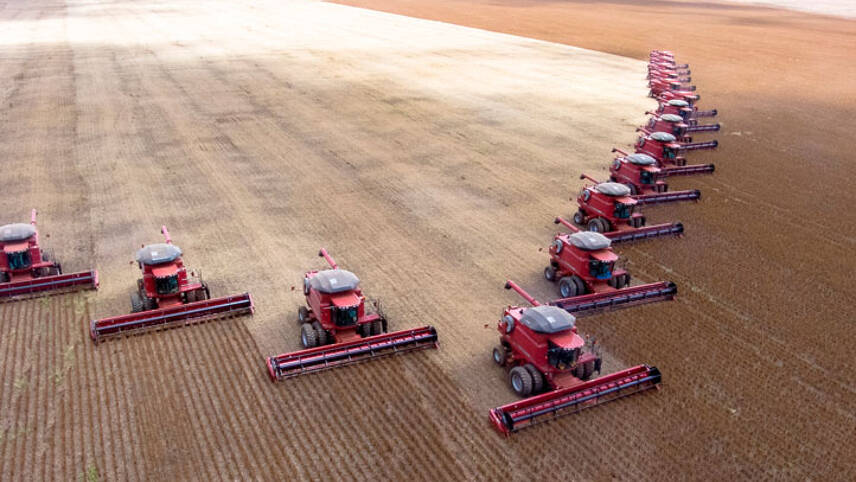Register for free and continue reading
Join our growing army of changemakers and get unlimited access to our premium content

Pictured: Mass soy harvesting in Brazil
The figure is the headline of the UN Food and Agriculture Organization’s (FAO) new report assessing the state of global food systems, released today (6 November) in the run-up to the next UN-convened annual global climate summit, COP28.
The FAO estimates that current flaws in our food systems are resulting in more than $7trn of costs relating to human health each year. It cites productivity losses and public health costs relating to obesity in many parts of the Global North, plus issues relating to malnutrition largely in the Global South.
Proven links between poor diets and conditions such as diabetes and certain cancers are outlined in the report.
Most of the remaining costs – around $2trn – are caused by the degradation of the natural environment. The UN FAO says this figure is likely to be underestimated due to a lack of high-quality data on a global scale.
Costs include rectifying and dealing with water pollution and habitat loss due to land-use change.
No country is immune to bearing these hidden costs, the report states. But low-income nations are disproportionately affected, with costs representing more than 25% of their GDP. This is in comparison to costs eating into an average of 12% of GDP in middle-income countries and 8% in wealthier nations.
The UN FAO has promised a more detailed assessment of the hidden costs in an update to this analysis next year. Its 2024 report will also make recommendations for specific policy interventions including changes to tax and subsidy systems currently propping up the food system.
For now, it is urging policymakers to begin factoring in the true costs of current systems into policy decisions, noting that these costs will increase without intervention.
It bears noting that, through the UN’s biodiversity treaty, around 190 nations have already agreed to collectively agreed to reform $500bn of environmentally damaging subsidies by 2030. As agriculture is one of the world’s most highly subsidised sectors, it would be remiss for reforms not to impact the industry.
Further clarity on the delivery of this ambition may well come out of COP28, which begins in Dubai on 30 November.
“It is my sincere hope that this report will serve as a call to action for all stakeholders – from policymakers and private-sector actors to researchers and consumers – and inspire a collective endeavour to transform our agrifood systems for the betterment of all,” said UN FAO director-general Qu Dongyu.
Fossil fuel dependency
The report from the UN FAO comes just days after the Global Alliance for the Future of Food published a new analysis of fossil fuel use in the food system and how this is damaging the environment.
This analysis found that at least 15% of the fossil fuels used each year across the world have applications in the food value chain.
The largest contributor is the use of fertilisers and pesticides which take large amounts of fossil-based energy to produce. Fossil fuels are also used to power temperature-controlled food storage systems and on-farm equipment like tractors. Moreover, they are embodied in the plastics used in food supply chains.
Policymakers at COP28 may be tempted to use this information to argue that a fossil fuel phase-out would be incompatible with food security. Already, nations are rowing over whether the goal should be an agreement to phase fossil fuels down or out, and whether that aim should include ‘abated’ fossil fuels (those whose emissions are partly addressed with carbon capture technologies).
Instead, the Global Alliance for the Future of Food is calling on policymakers to make a concerted effort to help scale low-carbon alternatives for the agri-food sector. Its analysis identifies solutions including alternative fertilisers; farming methods that limit pesticide and fertiliser use and electric technologies served with renewable energy.
The Alliance’s programme director Patty Fong said: “Shifting away from fossil fuel dependency towards renewable energy and regenerative and agroecological farming would not only protect our planet, but make food more affordable, enhance food security, create jobs, improve health, and help tackle hunger.”
Food, agriculture and water will be the topic of discussion at COP28 on 10 December, the last day of the summit before final negotiations on the official outcome agreement.


Please login or Register to leave a comment.